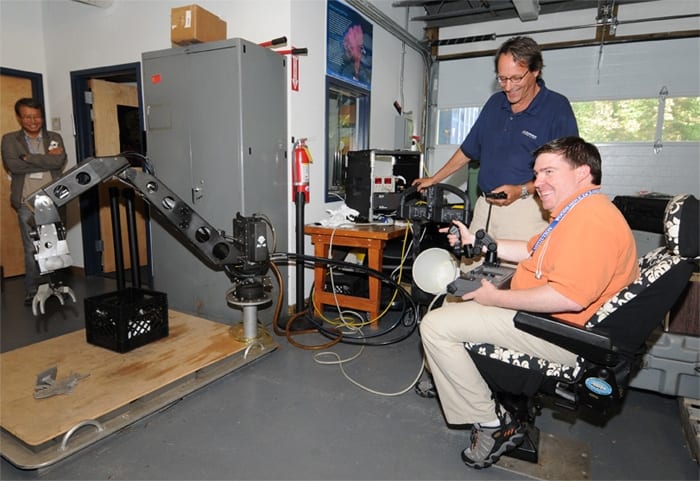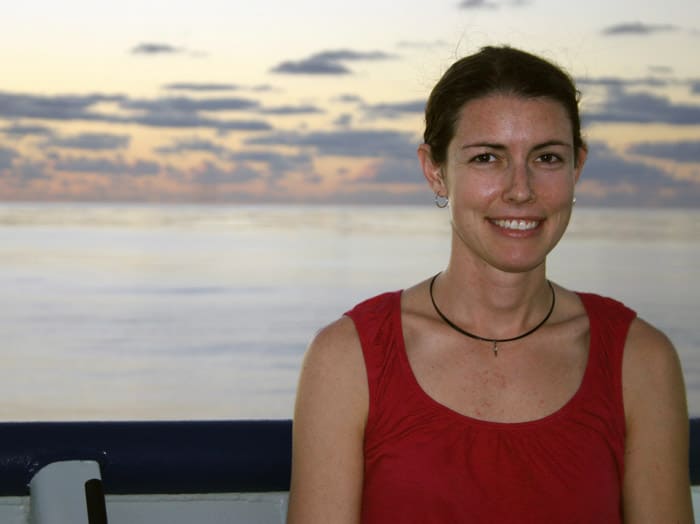News Releases
Researchers Highlight Growing Problem of Ocean Acidification
An international group of scientists, including researchers from the Woods Hole Oceanographic Institution, are working to improve communication about ocean acidification to help the public better understand the pressing global…
Read MoreDedication Ceremony Held for New Laboratory
WHOI President and Director Susan Avery and Director of Research Larry Madin were joined by National Institute of Standards and Technology (NIST) Deputy Director Willie May at a dedication ceremony Sept. 20 for the new Laboratory for Ocean Sensors and Observing Systems. The ceremonial ribbon cutting took place by the state-of-the-art facility’s high bay entrance, located on the Institution’s 160-acre Quissett campus.
WHOI received an $8.1 million grant from NIST in 2010 to fund construction of the new scientific research facility, as part of the American Recovery and Reinvestment Act. WHOI contributed $4 million to the project. The 27,000-square-foot, “green”-designed building will provide space for a major effort to create long-term ocean observatories.
Read MoreNew Website Invites Public to Help Identify Seafloor Life and Habitats
A new partnership between oceanographers studying seafloor habitats, Web programmers and social scientists has resulted in a unique, interactive website called “Seafloor Explorer,” which asks members of the public to help identify objects they see in images of the seafloor. Seafloor Explorer (www.seafloorexplorer.org) launches September 13.
The team has more than 40 millions images, but are launching the site with a preliminary set of 100,000 – all of them taken by HabCam, a habitat mapping underwater vehicle. HabCam was developed and built by the HabCam group, which comprises marine biologists and engineers from the Woods Hole Oceanographic Institution (WHOI) as well as fishermen and other scientists.
Read MoreNASA/WHOI Voyage Set to Explore Link Between Sea Saltiness and Climate
A NASA-sponsored expedition is set to sail to the North Atlantic’s saltiest spot to get a detailed, 3-D picture of how salt content fluctuates in the ocean’s upper layers and how these variations are related to shifts in rainfall patterns around the planet.
Read MoreHuman Impact Felt on Black Sea Long Before Industrial Era
When WHOI geologist Liviu Giosan first reconstructed the history of how the Danube River built its delta, he was presented with a puzzle. In the delta’s early stages of development,…
Read MoreTracking Fish Through a Coral Reef Seascape
Ocean scientists have long known that juvenile coral reef fishes use coastal seagrass and mangrove habitats as nurseries, later moving as adults onto coral reefs. But the fishes’ movements, and…
Read MoreWHOI Hosts Public Talk – Titanic in 3D: An Archaeological Exploration
Titanic is an iconic shipwreck that has fascinated the public for a century. But it also has a scientific and technological story to tell. On Saturday, Sept. 8, the Woods…
Read MoreConstruction Begins on Newest Ocean Research Ship
new ocean research ship, AGOR 27, Ocean Class ship
Read MoreWHOI Scientist Contributes to Nature Study on Ocean Health
WHOI Senior Scientist Scott Doney is one of several contributors to a new comprehensive index designed to assess the benefits to people of healthy oceans worldwide. The Index – being…
Read MoreWHOI to Host Public Event on Ocean Acidification
The Woods Hole Oceanographic Institution (WHOI) will host a public forum on ocean acidification and its effects on ocean life. Ocean acidification is a global problem that results from the…
Read MoreWoods Hole Oceanographic Institution Names New CFO
The Woods Hole Oceanographic Institution (WHOI) has appointed Jeffrey Fernandez to the position of Chief Financial Officer and Vice President of Finance. Fernandez assumes his post July 23.
Read MoreWHOI Announces 2012 Ocean Science Journalism Fellows
Ten writers and multimedia science journalists from the U.S., Canada, and Poland have been selected to participate in the competitive Woods Hole Oceanographic Institution (WHOI) Ocean Science Journalism Fellowship program. The program takes place September 9-14, 2012, in Woods Hole, Mass., on Cape Cod.
Read MoreWHOI Scientists and Engineers Partner with World-Renowned Companies to Market Revolutionary New Instruments
Woods Hole Oceanographic Institution (WHOI) researchers have partnered with two companies to build and market undersea technology developed at WHOI: the Imaging FlowCytobot, an automated underwater microscope, and BlueComm, an underwater communications system that uses light to provide wireless transmission of data, including video imagery, in real or near-real time.
Read MoreScientists Discover New Trigger for Immense North Atlantic Ocean Spring Plankton Bloom
On this July 4th week, U.S. beachgoers are thronging their way to seaside resorts and parks to celebrate with holiday fireworks. But across the horizon and miles out to sea…
Read MorePressure Testing of New Alvin Personnel Sphere Successful
The human-occupied submersible Alvin reached a major milestone in its upgrade project on June 22 when its new titanium personnel sphere was successfully pressure tested, reports the Woods Hole Oceanographic…
Read MoreMelting Sea Ice Threatens Emperor Penguins, Study Finds
At nearly four feet tall, the Emperor penguin is Antarctica’s largest sea bird—and thanks to films like “March of the Penguins” and “Happy Feet,” it’s also one of the continent’s…
Read MoreScientists Discover Huge Phytoplankton Bloom in Ice Covered Waters
A team of researchers, including scientists from Woods Hole Oceanographic Institution (WHOI), discovered a massive bloom of phytoplankton beneath ice-covered Arctic waters. Until now, sea ice was thought to block…
Read MoreA ‘B-12 Shot’ for Marine Algae?
Studying algal cultures and seawater samples from the Southern Ocean off Antarctica, a team of researchers from Woods Hole Oceanographic Institution (WHOI) and the J. Craig Venter Institute have revealed a key cog in the biochemical machinery that allows marine algae at the base of the oceanic food chain to thrive. They have discovered a previously unknown protein in algae that grabs an essential but scarce nutrient out of seawater, vitamin B12.
Read MoreClimate Change Led to Collapse of Ancient Indus Civilization, Study Finds
A new study combining the latest archaeological evidence with state-of-the-art geoscience technologies provides evidence that climate change was a key ingredient in the collapse of the great Indus or Harappan Civilization almost 4000 years ago. The study also resolves a long-standing debate over the source and fate of the Sarasvati, the sacred river of Hindu mythology.
Read MoreDr. Karen Lloyd Receives WHOI’s Holger W. Jannasch Visiting Scholar Award
The Woods Hole Oceanographic Institution (WHOI) has chosen Karen Lloyd, an assistant professor in the Department of Microbiology at the University of Tennessee in Knoxville, as the recipient of the…
Read MoreNew Study by WHOI Scientists Provides Baseline Measurements of Carbon in Arctic Ocean
Scientists from the Woods Hole Oceanographic Institution (WHOI) have conducted a new study to measure levels of carbon at various depths in the Arctic Ocean. The study, recently published in…
Read MoreWHOI to Host Public Forum on Climate Change and Global Water Supplies
Severe droughts, floods, and storms are now a routine part of our nation’s weather forecast. Remarkably hot and dry weather in 2011 caused droughts in Texas, the Plains states and…
Read MorePacific Islands May Become Refuge for Corals in a Warming Climate, Study Finds
Scientists have predicted that ocean temperatures will rise in the equatorial Pacific by the end of the century, wreaking havoc on coral reef ecosystems. But a new study shows that climate change could cause ocean currents to operate in a surprising way and mitigate the warming near a handful of islands right on the equator. As a result these Pacific islands may become isolated refuges for corals and fish.
Read MoreStudy Amplifies Understanding of Hearing in Baleen Whales
For decades, scientists have known that dolphins and other toothed whales have specialized fats associated with their jaws, which efficiently convey sound waves from the ocean to their ears. But until now, the hearing systems of their toothless grazing cousins, baleen whales, remained a mystery, largely because specimens to study are hard to get. Now, a new study by scientists at Woods Hole Oceanographic Institution has shown that some baleen whales also have fats leading to their ears.
Read More

